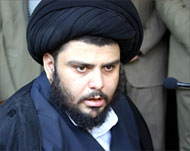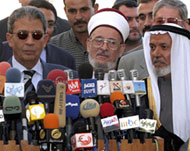Iraq president invites talks with foes
Iraqi President Jalal Talabani says he is willing to talk to violent opponents of his government if they want to contact him.

“If those who call themselves the Iraqi resistance desired to contact me, I would welcome them. I would not refuse to meet any Iraqi who wants to meet me. But of course that does not mean I will accept what he says,” he told a news conference on Sunday.
Talabani was in Egypt for a reconciliation meeting of Iraqi politicians, organised by the Cairo-based Arab League to prepare for a bigger conference in Baghdad after elections in December.
Iraqi government leaders have previously said they will talk to those who are not responsible for killing Iraqis and are committed to laying down their arms.
They have said a pre-condition for talks is that their negotiating partners show they have influence among fighters by persuading them to stop attacks.
No contact
Talabani said so far there had not been contacts with “those whom some describe as the resistance”.
In the opening session of the Cairo conference on Saturday, Talabani said religious extremists who advocate violence and Baathist associates of ousted Iraqi president Saddam Hussein had no role in the political process.
 |
|
Al-Sadr’s group threatened to |
“Our national unity … does not include under any circumstance the murderers and criminals among the followers of the old regime, who left us mass graves, or among the takfiris [Muslims who call other Muslims infidels],” he said.
It was not immediately clear whether Talabani meant to exclude these categories from his offer to open contacts.
The Iraqi president drew distinctions between three categories of people fighting the Iraqi government and US forces – “terrorists”, those who want to restore Saddam and those who want to drive foreign forces out of the country.
“To the latter, we say that the answer is not armed operations but political dialogue and democratic methods. Iraq is now an open country where any one can express his opinion … without relying on weapons,” he added.
Practical details
At the three-day meeting Iraqi politicians set aside differences for a while on Sunday and worked on practical details of the big conference in Baghdad.
But in statements on the sidelines of the Cairo gathering, they kept alive the dispute that erupted on Saturday over the US and British military presence and how to end it.
|
“Iraq is now an open country where any one can express his opinion … without relying on weapons” Jalal Talabani, |
Talabani told a news conference his country was not under foreign occupation and it would be a disaster if US forces left the country too soon.
“Those in Iraq now are foreign forces under a UN Security Council resolution and with the consent of the legitimate government,” he said.
“Their departure without a timetable or arrangement would be disastrous. We must complete building up the Iraqi armed forces so that Iraq can protect its security itself,” he added.
Timetable sought
But Transport Minister Salam al-Malaki, who is close to Shia cleric Muqtada al-Sadr, said a timetable for US withdrawal remained one of his group’s basic demands.
“Muqtada al-Sadr’s group has threatened to withdraw from the conference if the other parties do not offer more flexibility and if they do not distance themselves from their extremist positions,” he said.
 |
|
Harith al-Dhari (R) held talks with |
“We want three points – to condemn terrorism, and there must be a differentiation between resistance and terrorism, rejecting Baathists … and establishing a timetable for the end of the occupation,” Malaki said.
On the sidelines of the conference, Aljazeera reported that al-Jaafari held talks with Harith al-Dhari, the chairman of the Association of Muslim Scholars (AMS) in Iraq.
The meeting on Sunday focused on reports of Iraqi Interior Ministry abuse.
Al-Jaafari pledged to form a joint committee between the government and the AMS to investigate the abuse.
Al-Dhari also held talks with the United Iraqi Alliance list and with Muhsin Abd al-Hameed, head of the Iraqi Islamic Party.